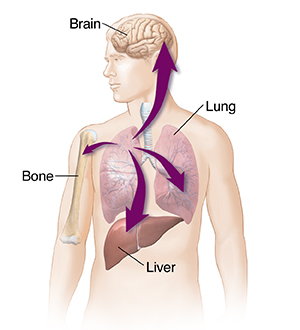What Is Lung Cancer?
There are 2 main types of lung cancer:
Non-small cell lung cancer
Most people with lung cancer have the type called non-small cell lung cancer. There are a few different types of non-small cell lung cancer. These include squamous cell carcinoma, adenocarcinoma, and large cell carcinoma. Though each of these subtypes starts in a different kind of cell in the lung, they're grouped together. They all have much the same treatment choices and outlook (prognosis).
Small cell lung cancer
Small cell lung cancer (SCLC) is much less common than non-small cell lung cancer. SCLC is sometimes called oat cell cancer. (This is because the cells are shaped like oats when viewed under a microscope.) This type of lung cancer tends to grow and spread faster than non-small cell cancer.
 |
| Lung cancer can spread to the other lung, the liver, brain, or bones. |
How cancer spreads
Cancer cells don’t always stay in one place. Cancer cells can break off from the place they first started. They can get into the bloodstream or lymph system and spread to other parts of the body. The lymph system is a network of nodes and vessels that help your body fight disease. It goes all over your body, much like your blood vessels.
When cancer spreads, the process is called metastasis. Lung cancer that spreads (metastasizes) often goes to the other lung or the liver, brain, or bones. The cancer cells in these other parts of the body look like, act like, and are treated like the cancer in the lung. These are not new cancers. For instance, when lung cancer spreads to the brain, it's called metastatic lung cancer to the brain or lung cancer with brain metastasis. It's not brain cancer.
How daily issues affect your health
Many things in your daily life impact your health. This can include transportation, money problems, housing, access to food, and child care. If you can’t get to medical appointments, you may not receive the care you need. When money is tight, it may be difficult to pay for medicines. And living far from a grocery store can make it hard to buy healthy food.
If you have concerns in any of these or other areas, talk with your healthcare team. They may know of local resources to assist you. Or they may have a staff person who can help.